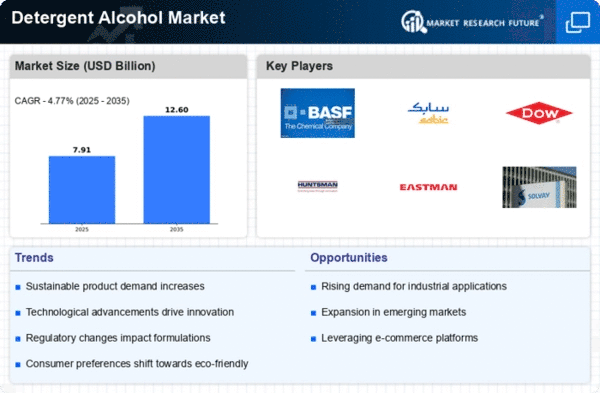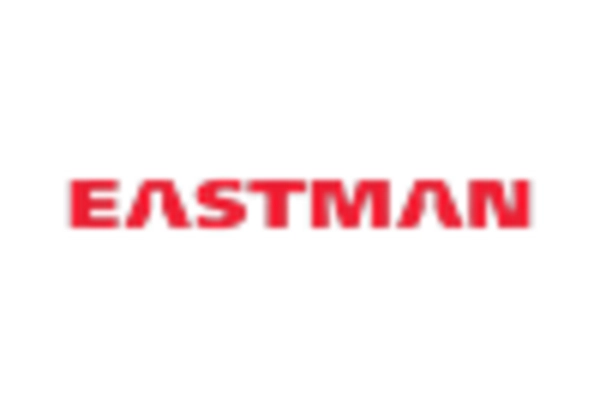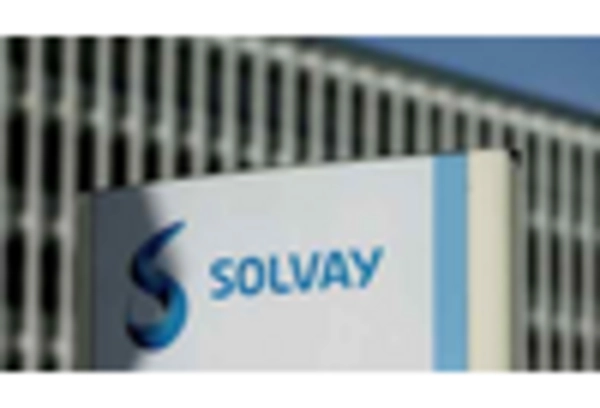Market Analysis
In-depth Analysis of Detergent Alcohol Market Industry Landscape
The Detergent Alcohol market is characterized by dynamic factors influencing its growth, with applications primarily in the production of surfactants and detergents. They play an important role in creating many cleaning materials and personal care products since they are fatty alcohols derived from natural oils or petrochemical feedstock. One of the main drivers behind the dynamics of this market is demand within the detergent and cleaning industry. The use of detergent alcohols as raw materials for making surfactants, which are essential components in home and industrial detergents for efficient cleaning action as well as effective emulsifying dirt and grease. Detergent Alcohol’s market dynamics are significantly influenced by personal care industry especially when it comes to formulating cosmetic ingredients such as toiletry products. These include those made from natural sources like fatty alcohols or synthesized through petrochemical processes used in skin care products, hair conditioners or other personal care items. In addition, mildness and skin friendliness requirements imply their inclusion among detergent alcohols that are preferred for use in cosmetics with regard to human health considerations.
Again, regulatory standards alongside environmental aspects define how things happen within Detergent Alcohol business environment. Biodegradability requirement; eco-friendly directive; safety legislation: all these govern what type of detergent alcohol should be selected for particular applications. Cleaning chemicals manufacturers demonstrate commitment towards environmentally friendly practices by producing sustainable and green formulations as part of a global effort geared towards reducing environmental impact of cleaning as well as personal care industry.
Furthermore, cost efficiency drives market dynamics in the Detergent Alcohol sector. Industries are looking for detergent alcohols that give best value for money while ensuring quality and performance, with manufacturers striving to find a balance between cost effectiveness and product effectiveness. This aspect becomes crucial both to producers and end-users, hence fostering innovation coupled with competition in the market.
Also, global economic factors affect Detergent Alcohol market dynamics. For example, economic downturns may influence consumer preferences on purchases, manufacturing activities or overall demand level for detergents used in household /industries. However, detergent alcohols are also widely used in other critical applications such as surfactant where they provide stability by mitigating the effect of economic uncertainties that would otherwise slow down growth.
Moreover, technological advancements contribute to the dynamic landscape of Detergent Alcohols market. On-going research enables production of better detergent alcohol processing techniques characterized by improved purity levels while new formulations with desirable performance attributes are developed as a result. These emerging technologies address changing demands from consumers leading to stiff competition among producers while increasing adoption rates for detergent alcohols into new or developing markets.
Another key factor that influences market dynamics is the demand for bio-based and renewable detergent alcohols. As sustainability becomes increasingly important in the cleaning and personal care industries, there is a growing preference for detergent alcohols derived from renewable sources such as palm oil, coconut oil, or other natural oils. Manufacturers are responding to this trend by offering bio-based alternatives that align with the principles of green chemistry.


















Leave a Comment